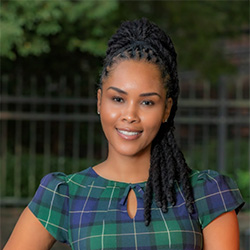
Dr Lateefah Id-Deen is an Associate Professor of Mathematics Education at Kennesaw State University in the United States and Founder of Loyal Educational Consulting. She has written several articles and book chapters and co-authored books entitled Disrupting Injustices: Navigating Critical Moments in Classrooms and Middle School Mathematics Lessons to Explore, Understand, and Respond to Social Injustice. She works alongside pre-service and in-service teachers to incorporate culturally responsive instructional practices that promote student-teacher relationships, affirm mathematics identities and cultivate belongingness to support students’ learning experiences in mathematics classrooms. Her work reflects her passion for creating equitable learning environments in mathematics classrooms.
1. What’s your earliest memory of doing mathematics?
As a young girl, I remember the excitement of coming home after completing a math assignment at school. I was so proud of my work that I couldn't wait to share it with someone. But it wasn't always my parents or siblings who were the eager students awaiting my lesson – it was our collection of dolls. With all that enthusiasm, I would arrange my dolls in a semicircle, assignment in hand, ready to share what I learned. At that moment, those dolls became my attentive students, each with their own name. This memory has stayed with me – a testament to the joy of learning and the innate desire to share new information with others, even if those 'others' were a group of silent dolls eagerly listening to me.
2. How has mathematics education changed in the time you have been involved in it?
Mathematics education has seen some changes, yet there's room for more change. Bob Moses’ Algebra Project brought insights that revolutionised aspects that I missed in my K–12 math journey. While the core principles of mathematics endure, the teaching methods have evolved significantly. The Algebra Project aimed to empower marginalised communities by offering robust math education. This initiative sparked a shift towards emphasising comprehension over memorisation. Subsequently, numerous scholars continue to advocate for equity, access and more inclusive mathematics teaching approaches that resonate with students’ everyday lives.
3. Tell me about a time in your career when something totally flabbergasted you.
Witnessing teachers and students transform their perception of math, by enhancing their math identity, never fails to amaze me. It's uplifting to observe individuals discovering joy in math, especially when they previously believed it was beyond their reach. Seeing someone who once felt disconnected or disheartened by mathematics suddenly find moments of genuine joy and accomplishment within the subject is truly remarkable. It's like witnessing a shift in mindset, as if a door to a world of possibilities has been opened. These moments of realisation and newfound confidence in math not only change their perspective on the subject but also positively impact their overall self-perception and belief in their abilities.
4. Do you practise mathematics differently in company?
Engaging in mathematical practice alongside others is truly a beautiful experience because it exposes you to diverse perspectives. This collective sharing of ideas, methods and solutions creates a space to understand how others examine mathematical challenges. This collaborative process not only broadens your own thinking but also fosters a deeper appreciation for the diversity of problem-solving methods and approaches in mathematics.
5. Do you think a brilliant maths teacher is born or made?
The journey to becoming an exceptional math teacher is multifaceted, and it can be an inherent passion or learned experience. For some, like me, the urge to teach emerges naturally, even if it begins with teaching dolls, siblings, or others. However, for many, the spark to teach and the appreciation for mathematics are ignited by an inspiring teacher or mentor who reshapes their perception of mathematics. The beauty lies in the diversity of pathways toward becoming an outstanding math teacher. What's crucial is that there isn't a single or predefined route to becoming a brilliant math teacher.
6. What’s the most fun a mathematician can have?
The potential for mathematicians to find joy and excitement is truly boundless when we centre our approach on cultivating curiosity and embracing the diverse experiences of our students. Mathematics isn't solely about numbers and formulas; it's a vibrant journey intertwined with personal narratives, cultural contexts and real-life applications. When students connect their unique life experiences to mathematical concepts, math becomes a tool that resonates deeply with their lives. By fostering an environment where curiosity thrives, we encourage students to explore math through their perspectives, making it relatable and engaging. Moreover, when we invite students to learn from the experiences of others, it enriches their understanding of math, fostering empathy and a broader worldview.
7. Do you have a favourite maths joke?
Sometimes I have trouble sleeping because my brain just won’t calm down.
Brain: Hey, are you sleeping?
Me: Yes. I had a very long day! *Closes eyes*
Brain: All odd numbers have the letter ‘e’ in them.
Me: *Opens eyes*
Join the conversation: You can tweet us @CambridgeMaths or comment below.